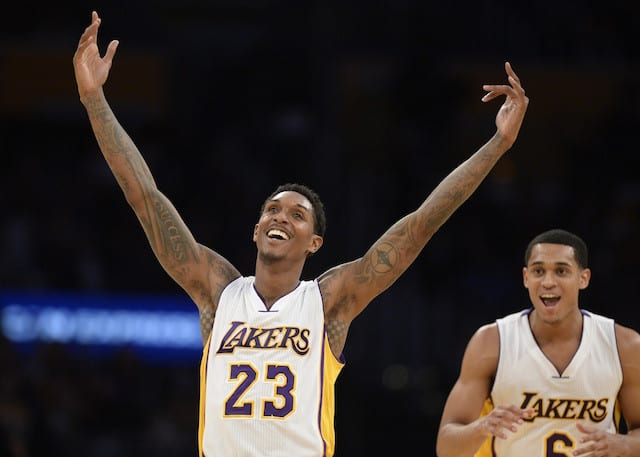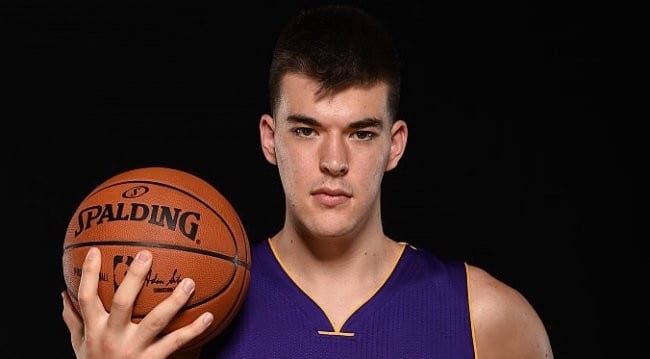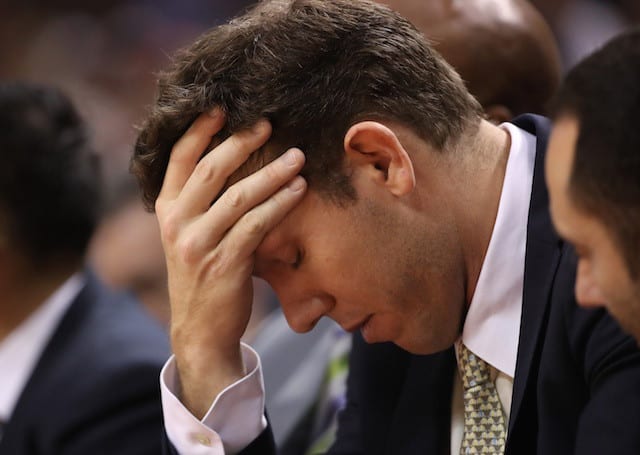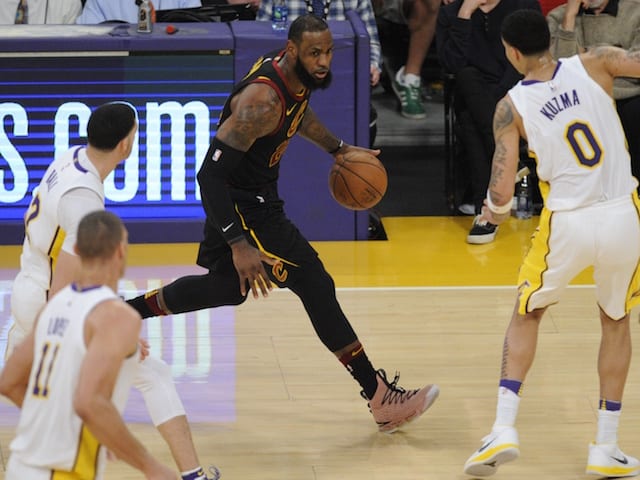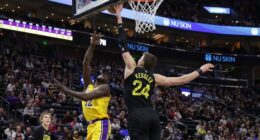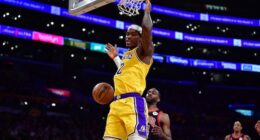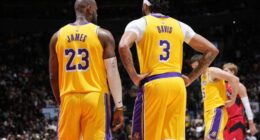When an NBA team’s leading scorer is not a member of the starting unit, it is not only unusual; it does not bode well for the fortunes of that team. Such is the case this season with the Los Angeles Lakers, who are led in scoring by Lou Williams, who has played in all 50 games but started only one (when both starting guards were injured). Williams is not just leading the team in scoring; he is doing so by a wide margin despite the fact he only ranks seventh on the squad in minutes played.
Williams is having a career season in many offensive categories. He is averaging 18.2 points per game while shooting 43.7 percent from the field and connecting on 37.9 percent of his three-point shots. His free throw shooting percentage is 88. He is also averaging 2.3 rebounds and 3.0 assists per game, and his PER rating of 23 far exceeds that of any other member of the roster.
All of these shooting statistics are well above his career averages, and most are career highs. Over the past twelve seasons, Williams averaged 12.7 points on 41.7 percent shooting overall and 34.5 percent from three-point range. He is a career 82.4 percent free throw shooter. If you ignore his first two years in the league when he barely played, his shooting percentage this year is the highest in his 12-year career.
Williams won the NBA Sixth Man of the Year award following the 2014-15 season when he was a member of the Toronto Raptors. Yet, his statistics that year paled in comparison to what he is averaging this year. He won the award while averaging 15.5 points per game while making 40.4 percent of his shots overall and 34 percent from behind the arc.
For most of this season, the Lakers have featured the number one scoring bench in the entire NBA. Much of that is attributable to Williams, who is the NBA’s leading scorer among all reserves. He would be the runaway choice for Sixth Man of the Year again, an award he probably won’t win only because the Lakers have been so poor this season and currently sit at the bottom of the Western Conference standings, a position they are also likely to occupy when the season ends.
Putting aside raw statistics, for those who watch Laker games religiously, the eye test is even more compelling. Whenever the team has fallen behind and made a comeback or stayed even with a better team it was not expected to beat; there was Williams in the middle of it all almost single-handedly keeping the Lakers in the game. Williams has also been a better than expected facilitator, averaging a very respectable three assists per game despite playing modest minutes.
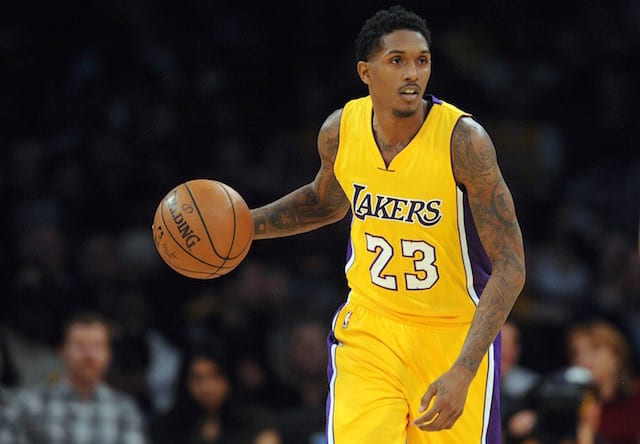
Another important factor is that in a year where the team has struggled with injuries to key players, Williams has proven to be durable despite being one of the smallest players on the court. He is one of only three Lakers who has played in every game this season (Jordan Clarkson and Brandon Ingram are the other two). His younger counterparts, and especially D’Angelo Russell, have shown a propensity for getting injured which is very harmful to a team struggling to improve and maintain a modicum of consistency.
Williams had a good season last year, too, his first with the Lakers, but it was overshadowed like everything else by the Kobe Bryant farewell tour. Byron Scott showed a lot of confidence in Williams. Fans forget that quite a few Lakers games went down to the wire last year, some to the very last shot, and then-coach Scott always trusted Williams in those circumstances whenever Bryant was out which was most of the time.
Williams is virtually the only member of this year’s team who does not panic with the ball in his hands with the game on the line. So often in the last few minutes of a game, the Lakers were right there with victory in sight, but they couldn‘t finish. They would go minutes without scoring at the end of games, with the clock winding down and the outcome in doubt, resulting in a loss.
Williams is not afraid to be the guy to takes the last shot, but this does raise one anomaly that is probably the reason why he is not a bigger star. NBA players make a name for themselves by showing that no matter how they played the first three quarters when they are really needed at the end of a game with the outcome in doubt, they can take over and lead their team to a victory. A prime example is what Paul George did for the Indiana Pacers in a game against the Lakers earlier this season. For three and a half quarters he was ineffective, but with the outcome in question late in the fourth quarter, he took over, took every shot, made them all, and secured the win for his team.
If one goes back and studies the last two seasons, even when Williams was red-hot for most of the contest, the only reason why the Lakers were still in the game, he has consistently been given a chance to win it at the end, and he has consistently misfired in those circumstances.
Still, even with his suspect defense, it is almost unimaginable to think of where the Lakers would be this season without Williams, who has kept the team in games or kept it close enough to avoid embarrassment. As valuable as he has been, however, in recent days, with the NBA trade deadline less than a month away, some are questioning whether Williams will still be on the team much longer.
One of the most intriguing questions facing the Lakers right now, and perhaps the most perplexing, is what to do with Williams going forward. Aside from the young core, who are not going anywhere, Williams is the most marketable member of the roster. He could help most playoff teams this year, as what team wouldn’t welcome more scoring off the bench?
Another factor which could make Williams attractive to other teams is his contract. When he joined the purple and gold two years ago, it was before the salary cap increase, so he signed what today would be considered a very modest three-year agreement at $7 million a year. This makes him woefully underpaid by current standards, and he is locked at this price for one more season.

Here is the dilemma: Williams is the best player on the Lakers at the moment, but the team is not winning and needs to look to the future. Williams is in his 30s, is not part of that future, and could be a valuable addition to a current title contender. In a trade, the Lakers might attract prospects from a veteran team that doesn’t need their current younger players, like Kent Bazemore was available to the Lakers a few years ago in a trade for Steve Blake. Or perhaps the Lakers might get a mid-low first round draft choice for Williams.
No matter what, Williams has been a solid competitor for the Lakers the past two years. This season he has been a joy to watch (although again, his defense could be better). He is quiet and soft-spoken, preferring to let his play do the talking for him. You can only shake your head in wonder when you see him hitting impossible acrobatic outside shots fading to his left, drawing a foul behind the arc to get three free throws, or leaving his man frozen in place while making a beautiful drive to the rim for an easy basket. Many opposing coaches have shaken their heads too admiring these same plays.
Watching Williams go into battle every night alongside younger players who are so raw and inconsistent, and at times disconnected, almost makes one feel sorry for him. Perhaps he deserves better at this point in his career and would be happier elsewhere. One way or another, Williams’ fate will be decided by the trade deadline on Feb. 23. It will be interesting to see what the Lakers decide.
